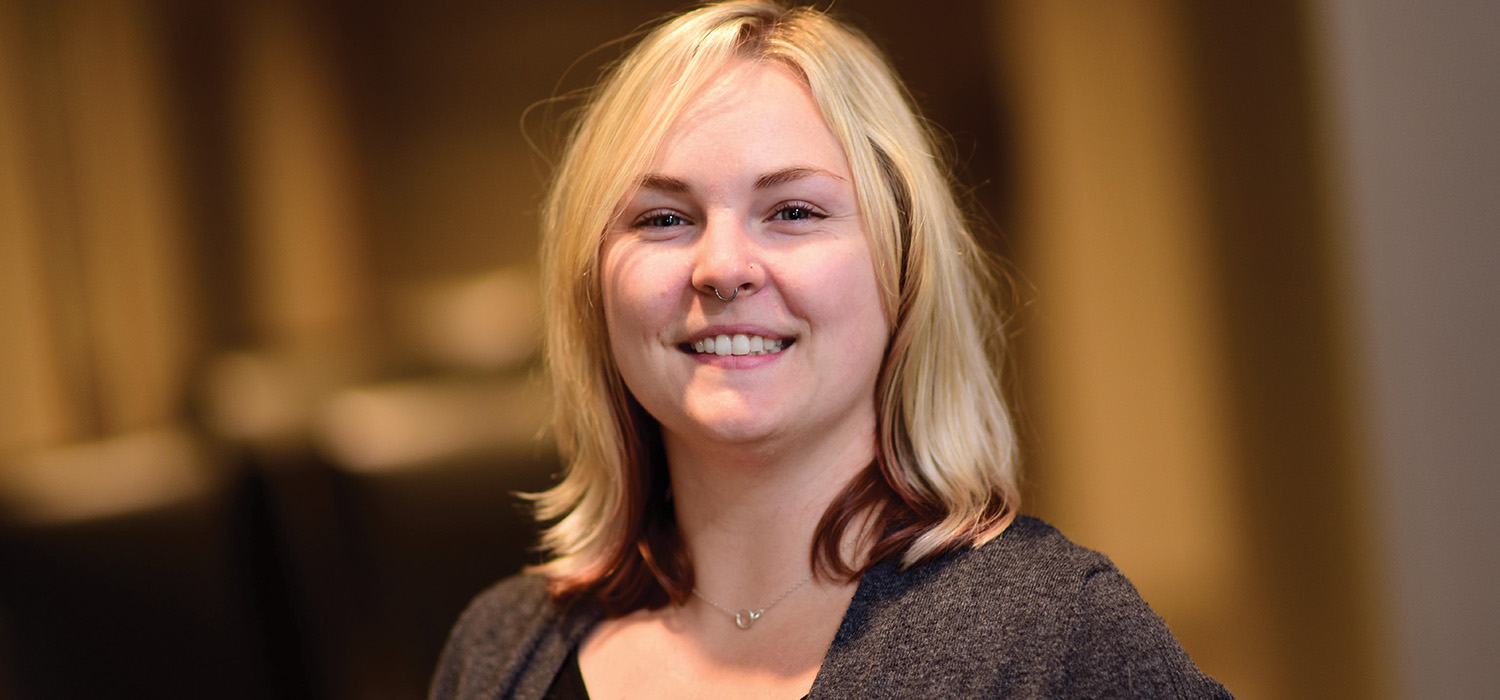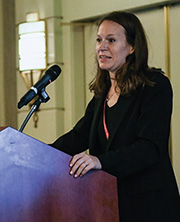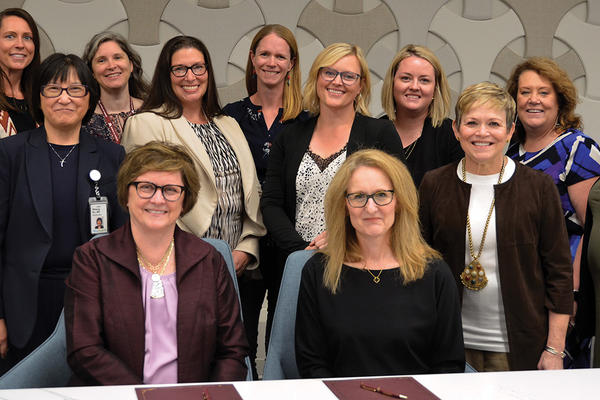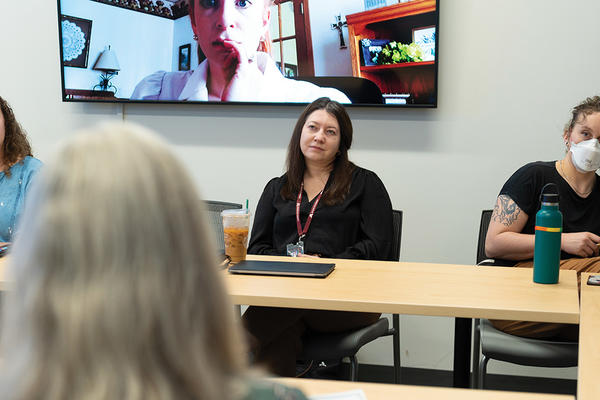Partnering to improve veterans’ care
Unique fellowship at the Minneapolis VA focuses on quality improvement
November 14, 2023
Brett Stursa

Lyndsay Thompson
As a charge nurse at M Health Fairview University of Minnesota Medical Center, Lyndsay Thompson learned she enjoyed being a resource for other nurses, researching answers to questions and acting as a troubleshooting guide. When she returned to the University of Minnesota School of Nursing to earn a Doctor of Nursing Practice (DNP) degree, she chose to become a clinical nurse specialist to focus on providing evidence-based expertise to improve patient care.
Now as a fellow in the VA Quality Scholars (VAQS) Fellowship Program, she is utilizing what she learned in the DNP program and furthering her expertise in implementing quality improvement projects. The VAQS Fellowship Program educates interprofessional clinicians within the Veterans Administration (VA) with comprehensive skills in quality improvement. Fellows, like Thompson, participate in national curriculum, local didactics, an annual conference, networking, mentoring from local faculty, and hands-on learning implementing quality improvement projects.
“I really appreciate that during the fellowship I am working on developing all of the elements I need to excel at advancing at the VA,” says Thompson, DNP, RN, who graduated from the School of Nursing earlier this year and is in the first year of the two-year fellowship.
VA, U of M partnership
While the fellowship has been around for two decades across the Veterans Administration, the Minneapolis VA joined the VAQS program in 2019.
Each site — there are 11 across the country — consists of a partnership between a VA hospital and an academic institution. The Minneapolis VA is partnering with the University of Minnesota.
“The Minneapolis VA Health Care System is proud to partner with the U of M on the VA Quality Scholars Program. It is a great privilege to mentor and learn from the next generation of nurses who will take care of our military veterans,” says Teresa Tungseth, DNP, RN, NEA-BC, associate director for Patient Care Services/Nurse Executive, Minneapolis VA Health Care System.
The fellowship has an interprofessional emphasis with physicians, doctoral-trained nurses, clinical psychologists and pharmacists as fellows and faculty. Fellows use their two years to focus on health care improvement research and scholarship, operations leadership, and teaching quality and safety.
The VA in Houston, Texas, serves as the coordinating center, delivering the national curriculum, fostering collaboration among the VA sites and hosting the annual quality improvement conference.
Local faculty, including Physician Senior Scholar Susan Diem, MD, MPH, Psychology Senior Scholar Michele Spoont, PhD, and Nursing Senior Scholar Judith Pechacek, DNP, RN, CENP, provide local curriculum based on their areas of expertise and mentorship.
“We are really shoulder-to-shoulder and arm-in-arm with the fellows as they blossom into the kind of professional they want to be,” says Pechacek, who serves as assistant dean of the DNP program at the School of Nursing. “Then they all move on to great positions.”
For Diem, the fellowship plays a critical role in the VA’s mission of improving veterans’ health. “The fellowship trains an interprofessional cadre of highly skilled health care professionals in quality improvement and health care leadership who are helping to transform the VA into a robust learning heath system,” she says.
Spoont agrees that improving veteran’s health is at the core of the program. “The fellowship creates clinicians, clinical leaders and researchers who have both the mindset and the skillset to improve health care services for veterans,” says Spoont. “Since improvement sciences are more effective if they are interprofessional, the structure of the program is particularly effective.”
Projects that make a difference
The Minneapolis site is a productive one. Since the Minneapolis VAQS fellowship began in 2019, there have been 10 fellows who have completed dozens of projects. They vary in size and scope, from redesigning nursing orientation to improving process flow and reducing cancellations in the endoscopy lab. When COVID hit, fellows completed a contingency documentation project. “The clinical staff was busy providing care, and because of the enormous burden of care, the documentation burden became too large. A team had to quickly come together and put together the guidelines for documentation during a pandemic or during this crisis staffing model,” says Pechacek. “It was an extremely fast project. They still used quality improvement techniques, however the entire project happened in just over a month. They deployed it. They put it out into practice and then they sunsetted it because they needed to move back into regular documentation.”

Becca Brown, PhD, RN, who graduated from the school’s PhD program in 2021, was one of the VAQS fellows serving on the project. As a new fellow, she served on the team that summarized literature, analyzed variables, created a decision algorithm and processed mapped how nurses were charting, as well as created a systematic way of collecting feedback.
She is now the first nurse scientist at the Minneapolis VA who is both working on her own independent program of research — for Brown it is peripheral artery disease detection and treatment — and serving as a house nurse scientist, assisting those in the hospital with their research needs for projects like addressing burnout and creating a virtual nurse program. “You walk a very fine line between quality improvement and research,” says Brown. “I want to both create evidence and implement it.”
She says the fellowship prepared her to serve in the nurse science role by developing a better respect for quality improvement and says the mentorship she received was key to her growth. “The experience of being mentored by the Senior Scholar team was by far the best part of being in VAQS. They really did set us up for success and helped us dive into the deep end with our quality improvement projects,” she says.
For Thompson, who began her fellowship this year, she’s already juggling four projects — from writing a chapter in a clinical nurse specialist textbook to working on standards of care documentation and evaluating the new primary care nurse practitioner residency program. She’s also serving on a committee working on a regional level to make VA facilities more age friendly.
“The clinical nurse specialist role is super versatile, which is what I liked about it. You can choose your own adventure,” says Thompson. She was familiar with the VAQS program before applying because her husband – a mental health nurse practitioner who she met when they both were students in Bachelor of Science in Nursing program at the University of Minnesota — completed the fellowship before her. “It was nice to see through him the different opportunities I would have,” says Thompson.
For Pechacek, the value in the VAQS programs is that it both strengthens quality improvement skills in doctorally educated health professionals while directly improving patient care.
“We improved access in the endoscopy lab by improving how we do intake. We improved access to mental health care by helping them quickly pivot to online mental health service delivery. We improved access to our inpatient units by improving flow through the ED,” says Pechacek. “We really try to marry the interests of the VAQS fellows with what is really critically needed.”
All the while, fellows are becoming experts in quality improvement.
“We are partnering with our fellows to push them in new directions, to make a difference, to get their scholarship published or presented,” says Pechacek. “I think that it has exceeded our expectations in terms of the scholarship that’s coming out, the collaboration and networking.”


